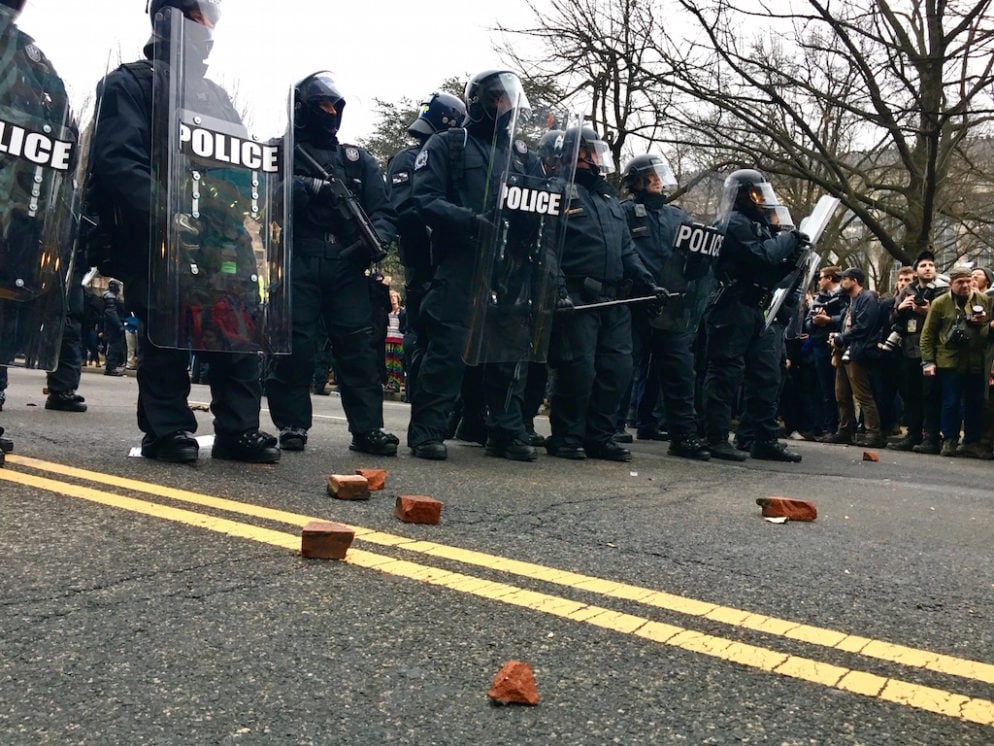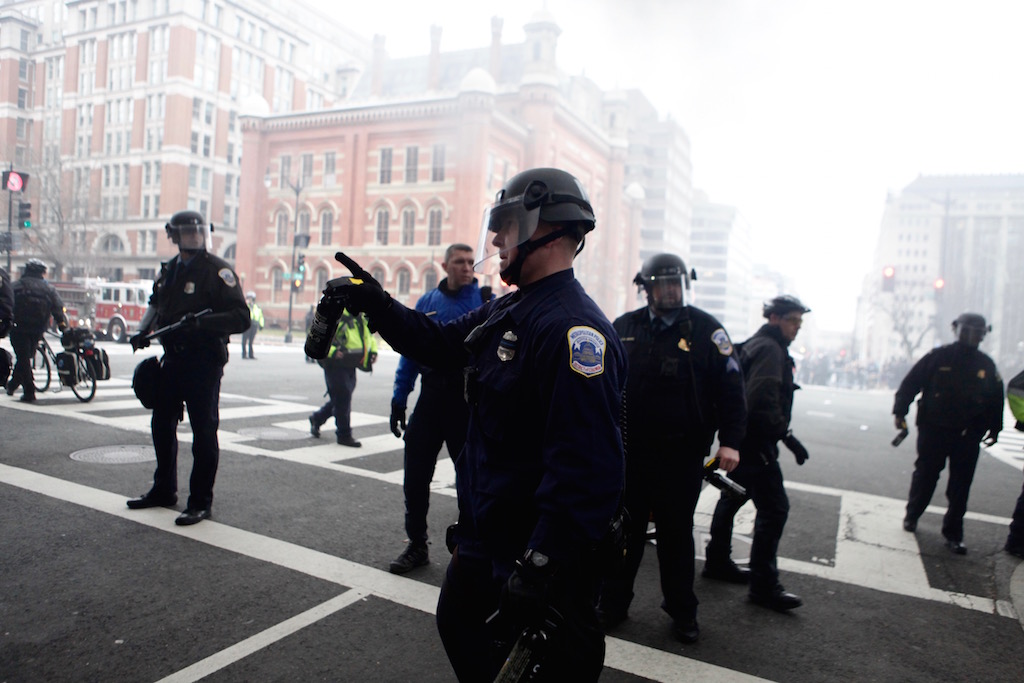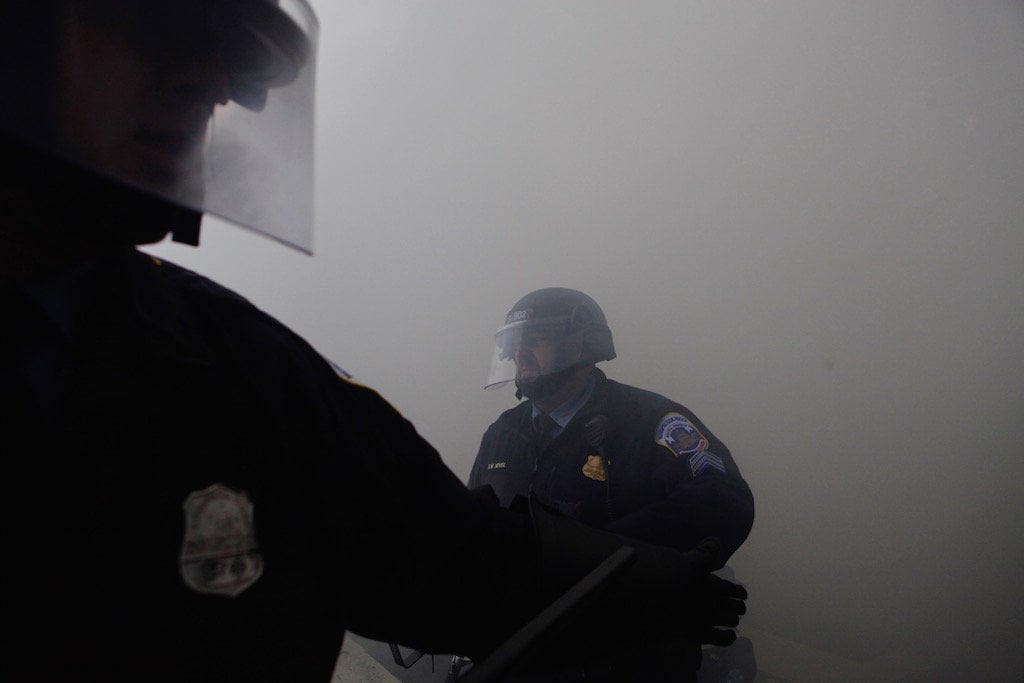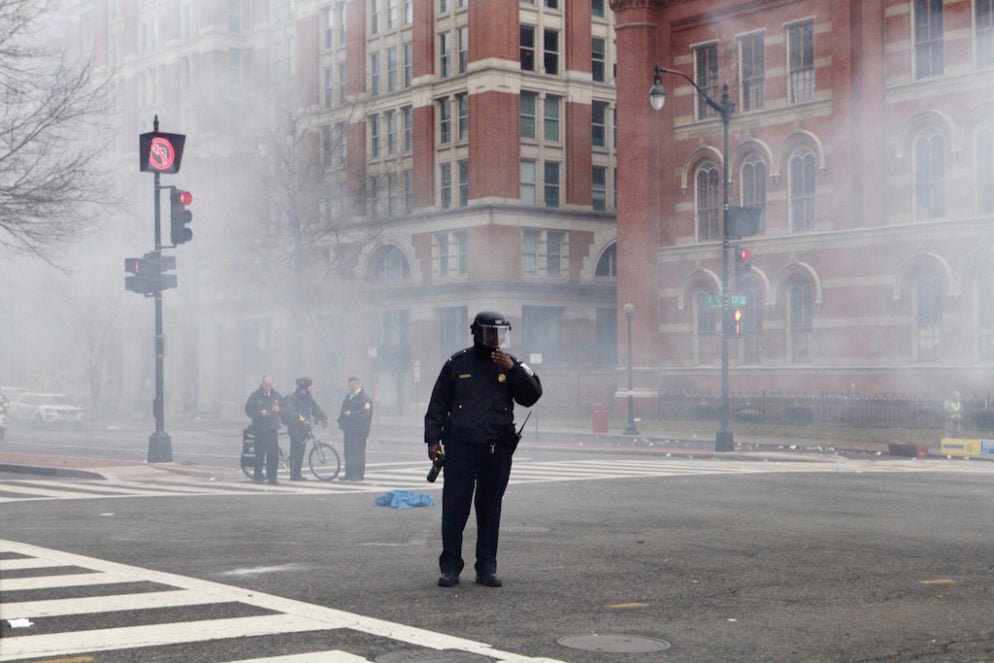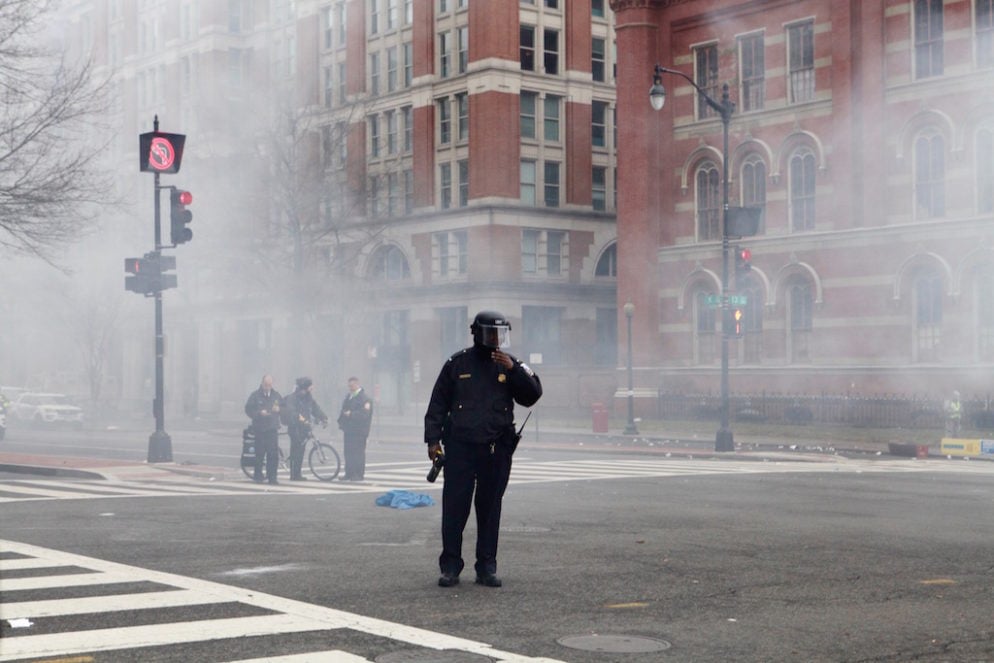A jury found six people not guilty of all charges related to a protest on Inauguration Day that turned violent, in a trial that has become a flashpoint for protesters’ rights and the First Amendment.
The US Attorney’s Office of DC said that it respects the verdict, but shows no sign of dropping the charges against the 188 other people who still face more than 50 years in prison for rioting and property destruction on January 20, 2017. “In the remaining pending cases, we look forward to the same rigorous review for each defendant,” the office said in a statement.
The jury of Washingtonians sent a note to Judge Lynn Leibovitz at 11:20 AM on Thursday that it had reached a verdict in this first group to face trial. Before they came into the courtroom a little before noon, jurors could be heard laughing with one another in the hallway. Defense attorneys looked at their clients as they tried to read the tea leaves.
Everyone in attendance stood one last time for the jurors as they filed in and sat in their seats—the same seats they had sat in for a month, as federal prosecutors argued that the six defendants were guilty of property destruction, despite having no evidence that any of them actually destroyed any property or even had a weapon.
Instead, by staying with the group, they aided and abetted the people who did smash the windows and otherwise cause upward of $100,000 in damage in downtown DC that morning, according to prosecutors, who said the defendants served as the getaway car.
Defense attorneys said that the case amounted to guilt by association, and there was no proof that they intended to wreak havoc that day.
Defendant Michelle Macchio, a 26-year-old from Florida, stood first as Leibovitz listed count one: A misdemeanor engaging in riot charge. “Not guilty,” the foreman said. People in attendance murmured in appreciation.
The second count: Misdemeanor conspiracy to riot. “Not guilty,” the foreman said.
Counts three through seven were all felony destruction of property charges. Not guilty, not guilty, not guilty, not guilty, not guilty.
Assistant US Attorneys Jennifer Kerkhoff, the lead prosecutor, and Rizwan Qureshi sat expressionless as they looked down, checking off charge after charge on paper.
Next was Jennifer Armento, a 38-year-old Philadelphian and 20-year-old Maryland student Christina Simmons. Not guilty on all charges.
Alexei Wood, of San Antonio, stood up after that. His case was thorny—he came to the inauguration as a journalist and had livestreamed the entire demonstration, down to the DC police encircling a crowd of more than 200 people at the end. The government used the 42-minute video as evidence against him. In enthusiastically narrating the events, was he encouraging it, as prosecutors contended?
No, the jury found. Wood began sobbing with relief as the cascade of “not guilty”s came down. Oliver Harris, a 28-year-old student also from Philadelphia, and Britne Lawson, 27, who was an oncology nurse in Pittsburgh before she had to quit to attend the trial, were acquitted of all charges, too.
“The jury as a whole believes it is a legal act to attend a protest at which vandalism occurs,” said Juror 16 as he stood outside DC Superior Court smoking a cigarette. He’s been a resident of Capitol Hill for 30 years, who works as an expert witness on economics.
“The jurors believe criminal acts were committed” on the morning of Inauguration Day, Juror 16 said, but the government never showed that the six people charged were responsible for the destruction. “The prosecution helpfully acknowledged it had no knowledge that any defendants committed an act of violence or vandalism.”
Lawson asked if she could hug him. He suggested a handshake instead, and commended her work as a street medic.
She’s one of two people, along with Macchio, who attended the protest with first aid kits, and Lawson was wearing a white helmet with a red cross taped on it. In closing arguments, Qureshi said that the gauze in Lawson’s fanny pack showed she “prepared for war.”
The case went to the jury last Friday afternoon, and they deliberated all of Monday and Tuesday. They were dismissed Wednesday after a juror called in sick, and began again on Thursday at 11 AM, coming to a decision about 20 minutes after that.
Simmons said she tried to keep her mind off the deliberations by reading (she finished the His Dark Materials trilogy on Wednesday). “I feel free, finally,” she said after the verdict came down. She plans on heading to South Carolina to visit her family tomorrow.
While she feels a “huge weight lifted off my shoulders,” Simmons adds that “I think the process is part of the punishment.” She says she’s had to focus on these hearings instead of her schoolwork and family.
Harris, another defendant agreed. “Being under the state’s thumb has infected all aspects of my life, professionally, personally,” he said in the court hallway.
He’s going to his mom’s house for Christmas, he said as he put his arm around her with a smile. Andree Duhaime has been in court to watch her son’s trial all month. “I’m obviously very happy,” she said. “I’m still shaking.”
His lawyer, Steven McCool, said that the “jury showed a deep appreciation for all our Constitutional rights. It came down to whether or not they were truly engaged in protected speech.”
But for Juror 4, a DC resident since 1982, “considering the future impact of First Amendment rights isn’t a part of our decision process.” Instead, he said, it was about whether the government presented evidence of the six defendants’ intent. As he emerged from the courthouse, he was met by loud cheers and applause from supporters of the defendants.
Juror 16 said that three of the defendants required more than one vote, though he declined to name them. Ultimately, though, the jurors came to a unanimous decision.
That doesn’t seem to be slowing down the US Attorney’s Office, which appears to be moving forward with cases against 188 others over the course of the next year, based on the statement it released. According to spokesperson William Miller, the government has dropped charges against 20 people and 20 others have pleaded guilty—19 of them to misdemeanors and one to felonies. (Miller declined a request to make Kerkhoff or Qureshi available for an interview.)
There’s a status hearing for what was once called the “December group” scheduled for January 19. Currently, those seven are the only ones who are only facing misdemeanor charges as opposed to felonies, an announcement made shortly before this trial began with little explanation other than “prosecutorial discretion.”
It’s unclear how much all of this is going to cost taxpayers. In addition to paying Kerkhoff, Qureshi, and other folks at the USAO to work on the case, DC police detective Gregg Pemberton has spent all of his on-the-clock time since the inauguration building this case from a desk at the US Attorney’s Office, and is expected to spend the next year as a witness in the courthouse.
That’s just the prosecution. At least three of the defense attorneys for this first group are court-appointed. Plus, there’s the additional security and the court itself, not to mention potential costs associated with civil lawsuits against the city and DC police for its actions that day, alleging unconstitutional arrests and excessive force.
Keith DeVille, the commanding officer that day, said during cross-examination that convictions in the case “would perhaps limit our civil liability in the matter.”
There’s also the $150,000 that DC Council allocated to review police conduct that day, following a request from the Office of Police Complaints.
A slew of future defendants were sitting in court to hear the verdict. One of them, Elizabeth Lagesse, has become an outspoken advocate since her indictment and has observed the proceedings daily.
“Finally, something makes sense,” she said. “Finally, something that’s good. We have a win under our belt now, and it just feels like the first win we’ve gotten.”
Lagesse was at court with her fiance, Michael Webermann, another defendant who is slated for trial in September 2018. The two got engaged a week before the inauguration, and had planned on moving to California. That was put on hold after their indictment.
“We stopped all wedding plans,” said Webermann. “We basically haven’t talked about our future—it’s just been in limbo.”
One person whose future became a little more clear is Simmons. She said she will return to the courthouse to support other defendants, and refuses to let this experience stop her from attending protests.
“I’m excited to get back to it,” said Simmons. “I’m ready to be back, spreading my truth”

